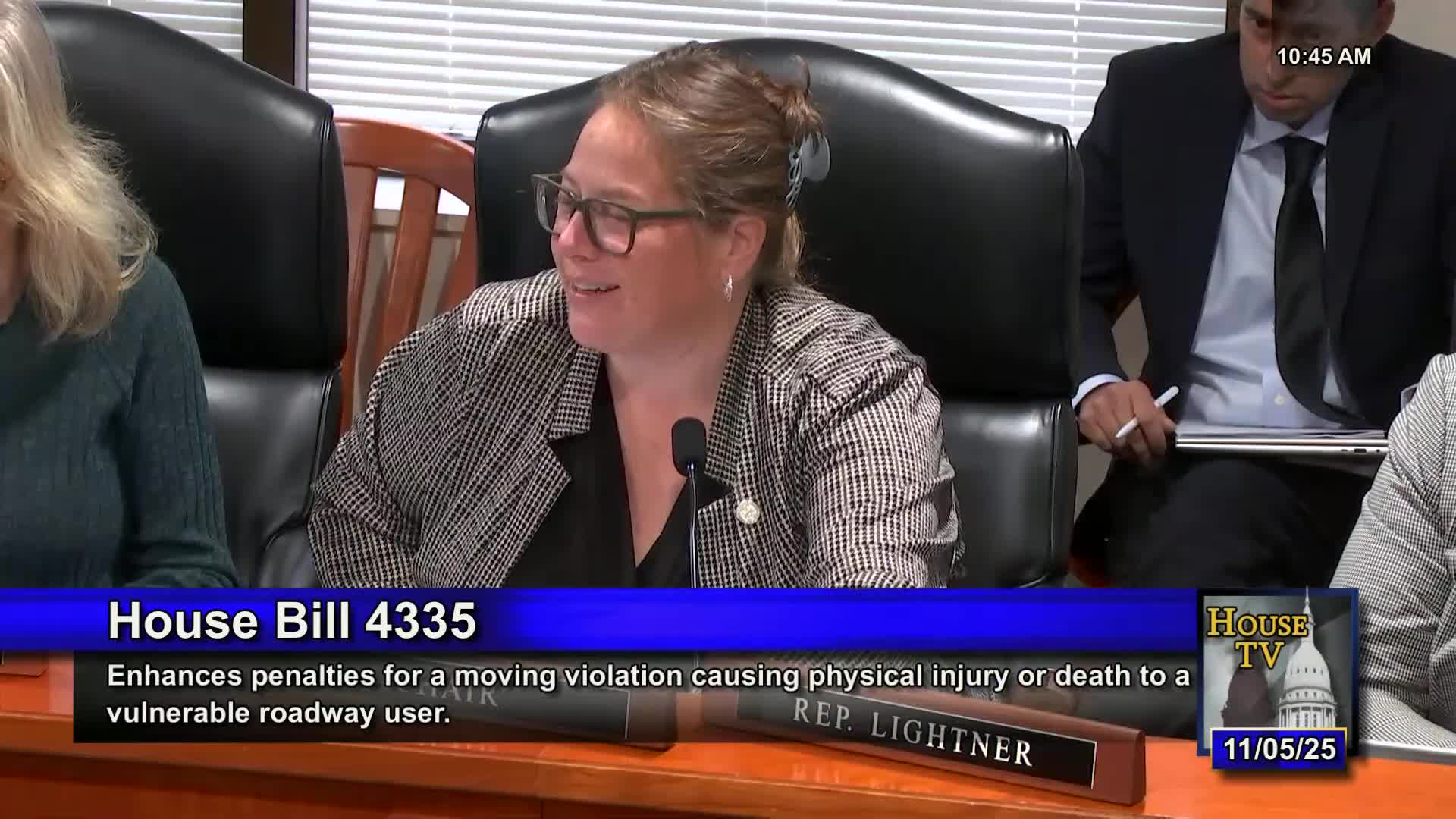Committee hears bipartisan bill package to expand protections for vulnerable roadway users
Get AI-powered insights, summaries, and transcripts
Subscribe
Summary
Representatives Rogers and Wenzel introduced a bipartisan package, House Bills 4334 and 4335, to expand penalties and statutory protections for pedestrians, bicyclists, wheelchair users and operators of low‑power transportation devices.
Representatives Rogers and Wenzel introduced a bipartisan package, House Bills 4334 and 4335, to create statutory protections and penalties for injuries to pedestrians, bicyclists, people using wheelchairs and individuals operating defined vulnerable transportation devices.
The sponsor, Representative Rogers, told the committee the package “expands protections to pedestrians, bicyclists, individuals using a wheelchair, or an individual riding or operating a vulnerable transportation device,” and said prior versions passed each chamber last term but ran out of time.
The bills propose a statutory definition of a "vulnerable roadway device" as a device propelled by human power or by an electrical propulsion system with an average power of about 750 watts (roughly 1 horsepower) or a maximum speed of about 30 miles per hour. The sponsor said the changes are intended to make it easier for prosecutors to charge cases that currently often result in misdemeanor motor‑vehicle citations instead of more serious felonies when the facts warrant it.
Survivors and advocacy groups gave extended testimony. Paul Runnels, a member of the Chain Gang cycling group that was struck in a 2016 crash in Kalamazoo County, said five riders were killed in that incident; he described the bills as providing “a much better tool to prosecute or at least investigate incidents where a motorist…has caused injuries or deaths.”
Stephanie Campbell, who testified that her fiancé was killed while cycling and that she is pregnant with his child, asked legislators for “empathy, accountability, and action,” saying the legislation would provide clearer paths to accountability for grieving families.
Jeffrey Kerrick, a retired law‑enforcement officer speaking as a longtime cyclist, told the committee many victims feel the criminal justice system “offers little accountability,” and described prosecutorial limits when only misdemeanor charges are available. Kerrick said the bills would provide prosecutors with “more appropriate tools” and noted that a number of other states already have similar laws.
Witnesses representing the League of Michigan Bicyclists and other nonprofits described a gap in current Michigan law that can make charging and prosecution difficult when motor vehicles injure or kill nonmotorists. Those advocates emphasized that the bills are intended to supplement, not replace, existing investigative steps.
Committee members asked sponsors to clarify intent and prosecutorial discretion; Representative Scott raised scenarios where a vulnerable user (for example, someone in a wheelchair) might not follow traffic rules and asked how the bills would apply. Sponsors and proponents responded that the bills provide an additional charging option but do not eliminate normal investigative or judicial procedures.
No formal committee vote on HB 4334 or HB 4335 is recorded in the transcript excerpt; the record shows extensive testimony and questions. The committee did not announce referral or a roll call disposition for these bills during the portion of the meeting provided.
This bill package drew testimony from survivors, nonprofit advocates, law enforcement and bicycling organizations, which framed the bills as a response to a pattern of crashes in which victims and their families believed available criminal penalties were inadequate.
